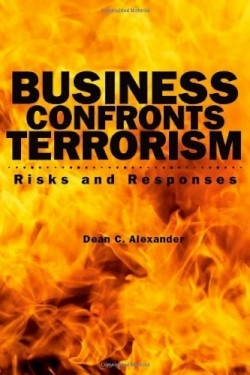Business Confronts Terrorism
Risks and Responses
After 9/11 the threat of global terrorism and its impact on business and economy became frighteningly clear, from stock market drops to effects on business operations and security. “Terrorists weaken industry and society,” writes the author, “through their manipulation of economic system components—companies, nonprofits, labor, capital, and technology—against their targets.”
This well-researched book intends to educate readers about the “complex and ever-evolving tensions of industry’s confrontations with terrorism.” Alexander has worked for years as a business executive and lecturer on international business law and terrorism at universities in the U.S. and abroad, and has written seven books and numerous articles on business, law, and terrorism. He takes a very factual, thorough approach, focusing on three main areas: terror threats and their role in economic systems, efforts to reduce terror threats, and the impact of terrorism on business and economy. The book includes more than forty pages of bibliographical references.
Alexander emphasizes the distinction that terrorist acts are not random gestures meant to annoy, but rather strategically executed attacks that attempt to undermine authority and cause fear and economic disruption. The first chapter lists numerous recent terrorist acts—and thwarted terror attacks—from around the world. In addition to the most widely publicized assaults in the Middle East and U.S., there are accounts of selected acts against global business targets from 2001 to 2003, including car bombs killing many people in Columbia, Indonesia, Kenya, Spain, Great Britain, and more. Examples highlight the diversity of business targets across industries including entertainment, energy, financial services, hotels, media, real estate, restaurants, retail, and transportation.
The third and fourth chapters contain interesting discussions on how companies and individuals directly and indirectly—even unwittingly—assist terrorists and terrorist groups, such as the global network of companies funding activities for Osama bin Laden. “The Islamic Resistance Movement (Hamas),” writes Alexander, “earned funds from ownership of textile businesses and cattle raising.”
While there is a small section on security preparedness, it’s not a major focus of the book. There’s one chapter devoted to general themes related to corporate security, including crisis management planning and security issues in real estate, transportation, chemicals, and sports sectors.
The author cites challenges with the developing public-private partnership in homeland security. Although it’s necessary for government and industry to work together on security and public safety, issues such as invasion of privacy or conflicts of interest arise when roles blur. Government spending supports business but its new security rules also result in increased costs to industry, as seen in the airline industry with the need to reinforce cockpit doors. “The movement towards privatizing some military functions creates some tension between government and business,” Alexander explains. Despite the challenges, he sees effective public-private cooperation as essential to combat the war on terror.
Reviewed by
Cindy Kryszak
Disclosure: This article is not an endorsement, but a review. The publisher of this book provided free copies of the book to have their book reviewed by a professional reviewer. No fee was paid by the publisher for this review. Foreword Reviews only recommends books that we love. Foreword Magazine, Inc. is disclosing this in accordance with the Federal Trade Commission’s 16 CFR, Part 255.

